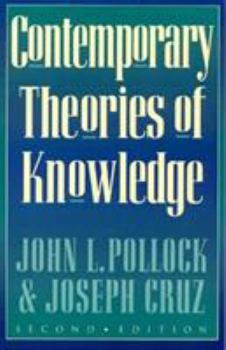Contemporary Theories of Knowledge
Select Format
Select Condition 
Book Overview
This new edition of the classic Contemporary Theories of Knowledge has been significantly updated to include analyses of the recent literature in epistemology. Rather than merely making slight amendments to the first edition, Pollock and Cruz have undertaken a groundbreaking assessment of twentieth-century epistemology. This book is both an advanced textbook offering traditional discussions of foundationalism, coherentism, and reliabilism and a detailed...
Format:Paperback
Language:English
ISBN:0847689379
ISBN13:9780847689378
Release Date:March 1999
Publisher:Rowman & Littlefield Publishers
Length:288 Pages
Weight:0.90 lbs.
Dimensions:0.7" x 6.1" x 9.0"
Customer Reviews
2 ratings
Disappointed with the number of underlining within the book
Published by M Trudgett , 5 years ago
Content is challenging.
Excellent introduction to epistemology.
Published by Thriftbooks.com User , 24 years ago
In the second edition of this volume, John L. Pollock and Joseph Cruz do a workmanlike job at a double task: (a) presenting a fairly comprehensive overview of contemporary epistemological theories (particularly in the broad area where more-or-less-analytical philosophy meets cognitive science), and (b) developing and defending an original theory of their own.(Note: Pollock has been working in epistemology for thirty-odd years and Cruz is a recent Ph.D.; I take it that Pollock was probably the leader in the work. I also don't happen to recall whether Pollock's was the only name on the first edition. Nevertheless the theory propounded in this volume marks important changes from Pollock's earlier views as presented in his own previous publications. At any rate I shall continue to refer to the theory developed herein as "theirs.")The presentation is organized very well and developed with the utmost fairness. The reader is introduced to the field of peistemology and taken on a guided tour of the basic classes of epistemological theory.The authors begin by dividing theories of knowledge into two overarching classes: "doxastic" theories (which hold that what one epistemologically ought to believe is a function solely of one's current beliefs) and "nondoxastic" theories (which think some consideration _other_ than one's current beliefs is relevant to the question of what one ought to believe next). Having made this distinction, the authors go on to discuss foundationalism and coherentism as "doxastic" theories, finding what they regard as insurmountable problems with each. (I disagree, by the way, but that is neither here nor there.)They regard their own theory (which they go on to develop at length) as "nondoxastic," a view at which they are able to arrive by distinguishing between a perceptual state itself, on the one hand, and beliefs _about_ such states, on the other. Here we might see the glimmer of a possible problem: for our authors, a perceptual state is not itself a belief state (at least, not solely).But that problem pales in comparison with another of the authors' main contentions (one which they themselves recognize as all but heretical): that in order to be taken seriously, a theory of knowledge should be implementable as a computer alogrithm. However, "heretical" or not, the authors do a fine job of defending their thesis, devoting several sections (e.g. "How to build a person") to a project dubbed OSCAR in which they try . . . well, to build a person.At any rate, whether one agrees or disagrees with their conclusion, the volume is a terrific introduction to the current state of epistemology -- with an absolutely outstanding bibliography into the bargain. If you're interested in the field, don't miss this fine contribution to it.






